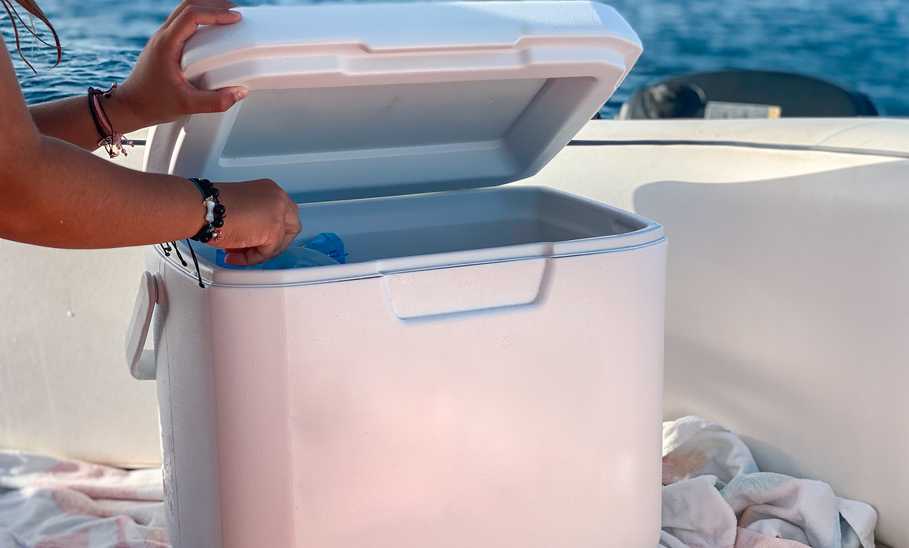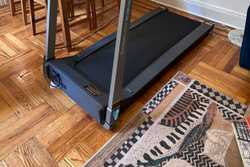- Construction: Plastic
- Dimensions: 17.5 inches x 22.6 inches x 17.6 inches
- Capacity: 84 cans
- Weight: 12.7 pounds
- Ice retention: 5 days
- Price at time of publish: $59
The Best Coolers that Keep Refreshments Colder Longer

Our evaluations and opinions are not influenced by our advertising relationships, but we may earn a commission from our partners’ links. This content is created by TIME Stamped, under TIME’s direction and produced in accordance with TIME’s editorial guidelines and overseen by TIME’s editorial staff. Learn more about it.
Whether you’re hitting the trail for a days-long hike, heading into nature for the weekend, posting up on the beach or just lounging in your backyard, chances are you’ll need a cooler. And while there used to be just a few styles and designs to choose from, the cooler market has exploded in both choices and technology in recent years. Here, we’re breaking down everything you need to know to choose the right cooler for you, plus sharing picks for the best coolers on the market based on the expert opinions of people who load them up with ice, drinks and more, week after week.
![[object Object] [object Object]](https://a.media-amazon.com/images/I/41EXnjun3aL.__AC_SX300_SY300_QL70_FMwebp_.jpg)
“I personally have a lot of coolers. However, my absolute favorite cooler is my Coleman Xtreme cooler,” shares Ryan Cunningham, founder of camping site Beyond the Tent. “It's just the most practical. It keeps ice for up to five days and it’s inexpensive. Many of my expensive coolers weigh far too much and don't hold a ton of food for how big they are and how much they weigh. The Coleman is the lightest and weighs the least of them all.” Add in the wheels and telescoping handle and this cooler is super easy to transport over pavement, grass or sand. It’s not the sexiest cooler on this list, but it will do the job.
![[object Object] [object Object]](https://static.velkybrands.com/i/items/3738004381.jpg?width=1000&height=1000&fit=bounds)
“For car camping, we really like our RTIC Hard Sided cooler,” says McDuffie. “It has a similar design and performance to the now iconic Yeti line of coolers but costs a lot less. We think RTIC coolers are a great value that gets you top-of-the-line performance without costing a small fortune.” Indeed, this cooler promises up to eight days of ice retention, despite the fact that it’s lighter than most coolers its size. Lid latches, non-slip feet, and two different carrying handle options round out some of the other features. You can also purchase a divider and/or basket for easier organizing inside. Just don’t be surprised by the three inches of insulation that shrinks the size of the cooler’s interior just a bit.
![[object Object] [object Object]](https://www.igloocoolers.com/cdn/shop/products/00062200-F.jpg?v=1678830141&width=2000)
Whether you’re heading out on the boat for the day or enjoying a quick overnight, this compact Igloo cooler will do the trick. “I use it for weekend trips where I need to bring some stuff,” shares Lauren Aber, an avid camper and hiker. “Just last weekend, I used it to come up to Vermont, where we knew we were cooking breakfast and one dinner, and it fit everything perfectly for that. It’s easy to carry with the shoulder strap.” The soft sides are weather-resistant, while a side pocket and built-in bottle opener round out the extra features. Plus, if you need to go bigger, this cooler also comes in a 30-can size.
![[object Object] [object Object]](https://media.pelican.com/img/products/cooler/20QT/pelican-20qt-small-fishing-cooler-elite-coolers-t.jpg)
The tall, narrow shape of this Pelican cooler, along with its sturdy handle, make it easy to tuck it in and pull it out from alongside or behind the seats of your car. Meanwhile, the size is perfect for stashing all the drinks and snacks you need for a day on the road, and it’s durable enough to survive any accidental tumbles onto the pavement. Since it’s a small cooler it won’t retain ice for as long as some of the big boys, but if you’re replenishing your rations every night that won’t be a problem.
![[object Object] [object Object]](https://m.media-amazon.com/images/I/31++4HmJioL._SL500_.jpg)
If the Yeti Tundra 45 is versatile, the Tundra 65 is all-purpose. One of the largest coolers on this list, it’s perfect for a family camping trip, a day at the beach with your friends, or a backyard barbecue. You’ll get everything you can expect from Yeti, including superior ice retention, rotomolded and bear-proof construction, and multiple handle options for transporting, plus an interior storage basket. The large size of this hard-sided cooler also means that it can double as a bench, table or even stage. It is pricey and may be hard to move around, but it makes up for that in durability and quality.
![[object Object] [object Object]](https://corkcicle.com/cdn/shop/products/9513GRQ_1000x.png?v=1687276799)
Our team tested the Corkcicle Chillpod Go, the smaller sibling of the Corkcicle Chillpod. With a 13-quart capacity, the Go is perfectly sized to fit just what you need for a day at the beach, accommodating up to 16 cans of your favorite beverage—or four 10-inch hoagies and four to six cans of the beverage pairing of your choice. While the Chillpod Go doesn’t have a rating for ice retention, our tests showed that ice packs stayed frozen after 12 hours on a hot, sunny day (and were semi-frozen 12 hours later). The cooler has a silicone latch and gasket inside the lid that prevents cold air from escaping, adding to the insulating effect. What we found most appealing, however, was that it was an unexpectedly stylish take on a traditional cooler. The curved lines and fun color options gives it a retro flair that made this a cooler you’ll want to show off. (Also, it was sturdy enough to double as a makeshift seat for a 5-year-old.)
![[object Object] [object Object]](https://a.media-amazon.com/images/I/71pyxMPKkKL._AC_SX679_.jpg)
With padded shoulder straps, a rigid and padded back panel, an adjustable sternum strap, and a weight of under three pounds, this Hydro Flask product is essentially a hiking backpack that also happens to be a cooler. If you’re planning a hike that will take all day and you want to stop for lunch in the middle, this is the cooler for you. It’s waterproof and watertight to withstand any moisture coming from outside or inside. The cooler will even stand up on its own for when you’ve reached an overlook and want to snap a photo without your backpack cooler on, a feature that’s also helpful for loading and unloading the cooler through the narrow opening at the top.
![[object Object] [object Object]](https://www.igloocoolers.com/cdn/shop/files/00034926-F.jpg?v=1684425760&width=2000)
“Our family is expanding and once we need a bigger cooler, we're going to pick up an Igloo Trailmate 70 qt cooler,” shares McDuffie. “The biggest reason is that it has wheels to help transport it. Fully packed coolers get heavy!” Indeed, this large cooler clocks in at nearly 35 pounds before you even start to fill it, so the ten-inch wheels and telescoping handle will certainly come in handy. But that’s not the only handy part about this cooler: It’s loaded with additional features perfect for the beach, such as a removable tray, self-draining cup holders, built-in bottle openers, an exterior storage pocket, an interior food basket, and two pole slots to hold a beach umbrella or fishing pole. What more could you need?
![[object Object] [object Object]](https://corkcicle.com/cdn/shop/products/90LP-S22-ORN-1_1000x.png?v=1685112595)
This good-looking backpack cooler from Corkcicle is spacious enough to hold snacks and drinks or a picnic lunch for a few friends. The wide top opening makes it easy to load, while the extendable side pockets mean that your large, insulated water bottle doesn’t need to take up space inside the cooler. A big front pocket offers enough room to stash your wallet, phone, and keys so you won’t need to take another bag with you to the park or the beach. While it looks a bit like a travel backpack, the Lotus isn’t built for distance, but if you’re walking a mile tops to the location where you’ll spread your blanket, it’s perfect.
![[object Object] [object Object]](https://corkcicle.com/cdn/shop/products/90BBB-S22-PN-12_1000x.png?v=1692884503)
Here’s a cooler with a particular set of skills: It’s more like a portable ice bucket and wine chiller with additional storage, than a standard cooler. Our team tested the lightweight insulated neoprene bag, which has a unique design featuring the central ice compartment (the aforementioned “wine chiller”) that closes with a heavy duty drawstring and very roomy exterior pockets that are just right for holding bottles of wine, rolled-up beach or picnic blankets, portable speakers, and everything else you need for an on-a-whim wine tasting under the sun or stars. Since it’s more of a cooler-adjacent product, ice retention isn’t necessarily the priority (that said, ice lasted in the central bucket for 3 hours). Instead, the benefit is being able to pop bottles or cans into the central bucket to quickly chill and put on display. The bag’s woven strap made the bag comfortable to carry, especially when worn on a bike ride (it wears like a cross-body bag). The fact that it comes in a fun assortment of colors adds to its charm, and the neoprene water-resistant exterior is very easy to clean. Overall, it was a great addition to our summer entertaining supplies—we just wish it was priced a bit more affordably.
![[object Object] [object Object]](https://a.media-amazon.com/images/I/61TKF+6IHdL.*AC_SX300_SY300*.jpg)
While there are lots of cooler brands that make coolers with wheels, RovR specializes in them. And as you would expect, the quality is exceptional: The thick wheels easily traverse any terrain and the telescoping handle makes it easy to pull. RovR is so confident in the quality of their wheels that you can even purchase a kit to attach this cooler to the back of your bike and pull it along the boardwalk. The only downside is the price, which is quite high for a cooler this size and could buy you multiple camping mattresses. At least it comes with a canvas bin (normally sold for $40) that fits on top of the cooler and straps down for additional pullable storage space.
![[object Object] [object Object]](https://a.media-amazon.com/images/I/7168B0FpoHL.__AC_SY445_SX342_QL70_FMwebp_.jpg)
“I have a Setpower electric cooler. It has two sections that you can keep at different temperatures, so you can have one act as your fridge and one as your freezer,” says Cunningham. This portable fridge/freezer combo plugs into the cigarette lighter in your car and uses your car’s power to maintain the temperatures, which you can set anywhere between 0°F and 50°F. It also has battery protection so you don’t need to worry about draining your car’s battery. “It is kind of unnecessary, but super cool,” Cunningham says. “It can be nice if you need to keep something frozen while camping or for me, my deep freezer broke and I had it as backup while I waited for my new one.”
Coolers come with a lot of bells and whistles these days—it’s one of the reasons that prices can climb into the hundreds of dollars. To select the best coolers, we consulted with camping experts, avid hikers, sportsmen, and others who use coolers regularly to best gauge which ones perform best in the wild. In sharing their favorites, our experts focused on a few important features. Additionally, our team tested select coolers in person, running them through various tests for capacity, durability, ice retention, and overall usability.
As is clear, coolers come at a variety of price points. If money is no object, you are going to get a higher quality cooler for a higher price. But if you’re looking for one that won’t break the bank, there are plenty of solid options on the market that will do the job.
Given that this is the literal point of a cooler, it was a big factor. All the coolers on this list tend to live up to the claims they make about ice retention time, as long as you’re packing your cooler properly to optimize performance. For more info on how to do that, read on.
Ease of use encompasses both size and how easy it is to transport. Especially if you’re looking for a cooler you can use regularly and/or for a specific activity, it needs to be the right size and style for that activity. Likewise, especially with larger coolers, it’s important to consider how much space it’s going to take up in your car, whether you’ll have extra hands to help you move it, or if you’ll most often be transporting the cooler solo (in which case you may need to go smaller or choose one with wheels).
If you’re going to invest in a quality cooler, it should last you for a while. You don’t want the shoulder strap fraying or the plastic cracking after one season. Like a good travel backpack, your cooler needs to hold up to the elements and withstand the wear and tear you put it through.
There are two primary factors to consider when choosing the best cooler for you: the size of the cooler and what you will use it for.
Before you even think about how much you want to spend on a cooler, think about what size you need, says Megan McDuffie, co-founder of Fresh Off the Grid, a site dedicated to cooking for camping and backpacking. “Having enough ice is the biggest part of keeping a cooler cold. If your cooler is undersized, you're more likely to skimp on the ice in order to pack all your food, and your cooler's performance will suffer, no matter how top-of-the-line it is,” she explains. Instead of deciding on a brand and style and then seeing what your budget will buy you, McDuffie suggests a slightly different approach. “Get the biggest cooler you can for the budget you have,” she urges, “knowing that even with a cheaper cooler, you can compensate for a lot with enough ice.”
That said, before you purchase a cooler the size of an inflatable pool, consider the types of activities you are going to use it for. If you’re planning a day hike and want to pack some drinks and one meal, you don’t want a 70-quart hard-sided cooler. Likewise, a backpack cooler isn’t going to cut it for a five-day camping trip with your family. Think about what you are using the cooler for and who will be responsible for transporting it and then go as big as you can.
There are two different designs when it comes to coolers: Hard-sided and soft-sided. Like we mentioned earlier, thinking about the types of activities for which you plan to use your cooler will help you determine whether a hard or soft one is best. That’s because there are a couple primary ways that the two differ.
A soft-sided cooler is light, portable, and versatile. If you’re looking for a cooler that you can take to the park, on a boat, to the beach, or to your child’s soccer game, a soft-sided cooler is going to be a good choice. With handles, shoulder straps, and backpack-style straps, soft-sided coolers are much easier to transport from place to place. What they have in portability, however, they lack in performance; soft-sided coolers don’t have as reliable ice retention and are not as durable as hard-sided coolers.
A hard-sided cooler is big, durable, and better insulated. If you’re looking for a cooler to keep your food cold for a days-long camping trip, a hard-sided cooler is a must. Since they aren’t meant to be easily transported, hard-sided coolers come in massive sizes. Thanks to their thick, insulated walls, hard-sided coolers retain ice for much longer than soft-sided coolers and will do a much better job of withstanding the elements. But just as with soft-sided coolers, these perks do come with some downsides; hard-sided coolers are heavy, bulky, and (usually) take up a lot of space, plus they’re more expensive.
“Start by pre-chilling both the cooler and any food you are going to pack,” says Cunningham. You can do this by filling it with cold water or ice that you dump out before you start packing the cooler. “When packing, use a combination of ice packs/blocks and ice cubes, placing a layer of ice at the bottom of the cooler to create a cold foundation.” Food that you are not going to eat until later in your trip can be frozen and placed at the bottom as well, where it will double as ice.
Items should be repackaged so they are completely airtight and can be packed in a way that eliminates as many spaces as possible. “Air and space are your enemy, so fill in the gaps between items with more ice or ice packs to maximize contact and thermal efficiency,” Cunningham says.
In terms of packing order, more perishable items like meat and dairy should be placed towards the bottom, while things like drinks, fruit, and veggies should be closer to the top. “To ensure your cooler stays at a food-safe temperature (41°F) for as long as possible, you’ll want to aim for a 2:1 ice-to-food ratio,” says McDuffie. If you have the space, large blocks of ice or frozen water bottles are going to last longer than ice cubes. “If you can freeze a gallon jug of water, that works amazingly well,” Cunningham adds. Finally, keep your cooler out of the sun as much as you can and open it as infrequently as possible.
Yeti coolers are the best of the best. While it’s hard to beat their quality, brands like RTIC and Igloo offer coolers that perform extremely well for a fraction of the price. If your cooler use is on the casual side, you likely won’t notice the difference.
Expensive coolers are going to be better quality, admits Cunningham, but they tend to be bulkier, too. “To get the seven-plus days of ice, they need really thick walls,” he says. “To be rock solid, they need thick plastic. This creates what I like to call Cooler Glut, heavy and huge coolers that don't really hold all that much.”
Cunningham also urges folks to consider whether they really need all the bells and whistles. If they do, it’s worth it. But if not,“I always ask people how often they need something cold for longer than a weekend or how often they need a bear-proof cooler. Their answers are usually never,” he adds. “You can get a solid cooler that will cover all your needs and won’t break the bank.”
The information presented here is created by TIME Stamped and overseen by TIME editorial staff. To learn more, see our About Us page.



